HR teams face a common challenge: employee files scattered across multiple systems, making simple tasks unnecessarily complex. When critical documents live in different folders, drives, and email threads, routine requests consume hours instead of minutes. Compliance deadlines get missed. Onboarding slows down. And HR professionals spend their time searching for files rather than supporting employees.
Employee file management software addresses these pain points by centralizing all personnel documents in one secure, accessible system. This guide covers what HR teams need to know when evaluating solutions: from essential features and security requirements to compliance capabilities and integration options. We’ll also explore how platforms like monday service help organizations connect their HR data with broader workflows to eliminate silos and streamline operations.
Try monday serviceWhat is employee file management software?
Employee file management software operates as a centralized, intelligent digital repository for all personnel-related documents. It replaces physical folders, shared drives, and email threads with a single, secure digital workspace, providing instant access to everything from employment contracts to performance reviews.
This centralization establishes a single source of truth for your entire workforce, bringing order to administrative chaos. Critical processes like onboarding and compliance get streamlined, liberating your HR team to concentrate on higher-impact strategic work.
Within a platform like monday service, these documents are linked to your broader service operation. Files connect to support tickets, automated reminders get triggered, and static information transforms into an active part of the platform that enhances organizational agility.
7 key benefits of digital employee file management
Is your HR team spending too much time searching for paperwork? Transitioning to digital employee files eliminates the administrative maze, creating a direct path to the information you need. This allows your team to focus on their primary mission: supporting your people.
This evolution is more than replacing filing cabinets with digital folders; it’s about building a smarter, faster, and more connected workplace. When your HR engine operates with this level of efficiency, the entire organization benefits from accelerated processes and a team empowered to drive genuine growth.
- Win back your team’s time: Find any employee document in seconds. Those saved moments quickly become hours, freeing your HR team from administrative deep-dives to focus on strategic work that moves the whole company forward.
- Reduce costs and scale smarter: Digitization delivers significant ROI by eliminating recurring costs of paper, printing, and physical storage. The system grows with you, so you can scale your team without scaling your administrative headcount.
- Empower your people with self-service: Give your team control over their own information. With easy-to-use self-service portals, employees can access their documents anytime, reducing one-off requests for your HR crew. Your people feel empowered, and your team gets to focus on bigger things.
- Nail compliance and reduce risk: Turn compliance from a constant worry into a well-oiled machine. Automated tracking, retention schedules, and audit trails keep you always prepared. When auditors knock, you’ll have everything ready to go.
- Lock down data with advanced security: Your team’s data deserves fortress-level protection that paper files can’t offer. Access controls and audit trails show exactly who sees what and when, building trust and giving everyone peace of mind.
- Support your team, wherever they work: Modern flexible work models require equally agile operations. A digital system ensures your HR team and employees have secure access to everything they need, whether they’re in the office or across the globe.
- Make smarter decisions with real data: Stop guessing and start knowing. Turn your employee data into actionable insights to spot trends, plan for the future, and make confident decisions that fuel company growth.
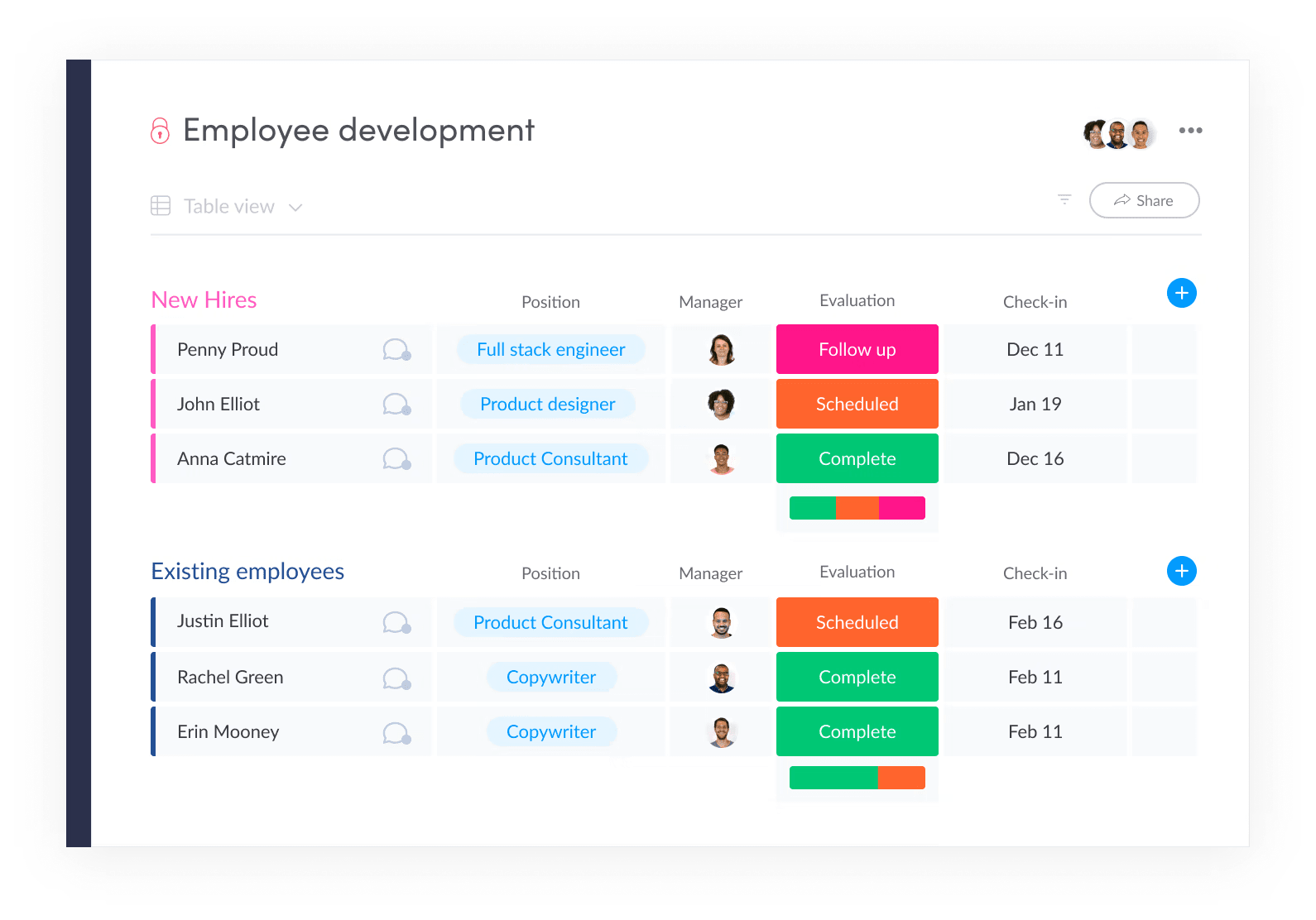
Key features of employee file management software
The right employee file management system transforms scattered documents into a streamlined, central resource that actively works for you. It’s about reclaiming valuable time for your team to focus on what matters most—your people.
Look for intuitive organization, powerful search capabilities, uncompromising security, and precise version control. With monday Service, your documents integrate directly into your team’s workflows and service delivery, while real-time analytics and AI help you identify trends and optimize operations.
Document organization and search capabilities
Finding the right document shouldn’t feel like a treasure hunt. Look for intuitive folder structures that mirror how your team works, combined with powerful search that locates any document in seconds. Smart tagging, metadata, and full-text search mean you’ll have everything at your fingertips instantly—whether it’s a specific contract or a performance review from two years ago.
Security and access control features
Protecting your team’s information should be seamless, not an afterthought. monday Service embeds enterprise-grade security directly into your workflows, with powerful encryption that renders data unreadable to unauthorized parties.
Configure permissions with granular precision—managers see their team’s files, HR accesses what they need, and employees view their own documents. Role-based access controls eliminate unnecessary roadblocks, while automated backups protect your data against everything from minor glitches to major outages.
Compliance and audit management
Transform compliance from a persistent concern into a core operational strength. monday Service consolidates sensitive employee documents in one secure environment, helping you proactively manage regulations like HIPAA, FMLA, and GDPR with guardrails built directly into your workflows.
The platform automates retention schedules and secure disposal protocols while generating audit-ready reports at a moment’s notice. Version control creates complete audit trails showing exactly who accessed what and when, making audit preparation surprisingly straightforward.
Automation and AI-powered workflows
Intelligent automation shifts your HR team from administrative tasks to strategic initiatives. Our platform’s built-in AI automatically sorts new hire documents, flags compliance deadlines, and extracts key insights from performance reviews—condensing hours of manual work into seconds of smart processing.
Upload a batch of resumes and watch them get instantly categorized and routed to the appropriate hiring managers while your talent pipeline updates in real time. This is the power of intelligent automation integrated directly into your workflow.
Integration with HR technology stack
monday Service functions as the central nervous system for your tech ecosystem, connecting everything from your HRIS to payroll so data flows seamlessly across systems.
Employee promotions or role changes automatically propagate everywhere in real time. We connect with your single sign-on (SSO) provider for secure, one-click access, and our flexible API framework lets you build custom connections for any unique or legacy tools in your lineup.
Try monday serviceTop employee file management software solutions
The right employee file management software turns administrative chaos into operational advantage. We’ve highlighted some of the leading platforms below to help you make an informed choice.
1. monday service
monday Service transforms employee file management through its AI-powered service management platform that connects HR workflows with your entire organizational ecosystem. The platform specializes in no-code customization and cross-departmental collaboration, making it ideal for HR teams who want to break down silos and streamline operations. Unlike traditional HRIS systems, monday Service integrates employee data management with broader service operations for a truly unified workspace.
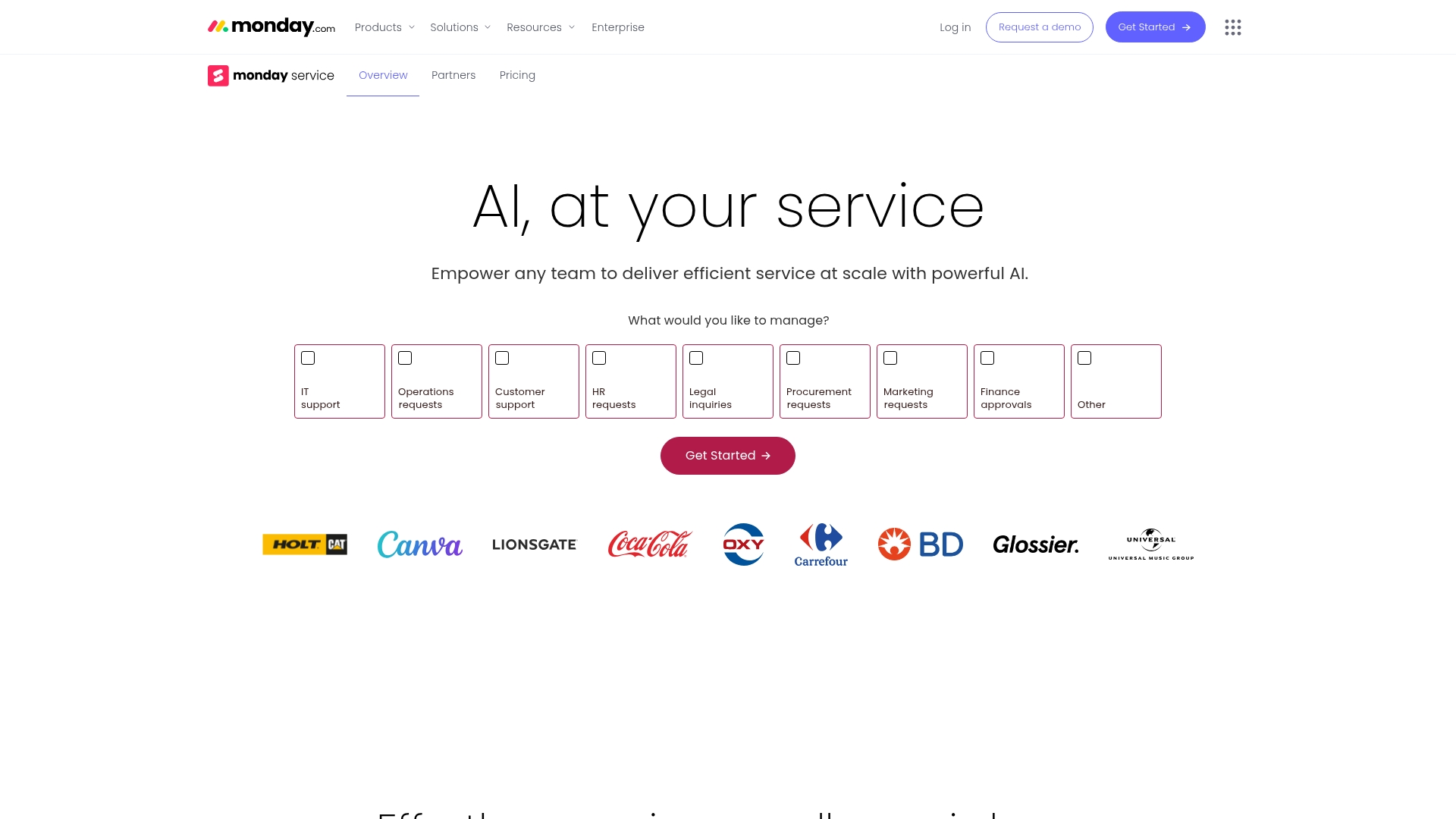
monday Service empowers HR teams to create a centralized employee file management system that seamlessly integrates with recruitment, onboarding, performance reviews, and leave management — all within one collaborative workspace.
Key features:
- Centralized employee database: Store all employee information, documents, and files in one secure, permission-controlled workspace with automated workflows for onboarding and performance tracking
- AI-powered automation: Leverage smart ticket routing and automated reminders for expiring certifications, pending reviews, and leave requests to keep HR processes running smoothly
- Cross-departmental collaboration: Connect employee data with project management, service operations, and other business workflows for complete organizational visibility
Pricing:
- Free: $0 (up to 2 seats, 3 boards, basic features)
- Basic: $9/month per seat (billed annually, unlimited items, 5GB storage)
- Standard: $12/month per seat (billed annually, timeline views, automations up to 250 actions)
- Pro: $19/month per seat (billed annually, private boards, advanced automations up to 25K actions)
- Enterprise: Contact sales (advanced security, enterprise-scale automations up to 250K actions)
- Minimum 3 users required, yearly plans save 18%
Why it stands out:
- Unified workspace approach: Unlike standalone HR systems, monday Service connects employee file management with your organization’s broader service operations and project workflows, eliminating data silos
- No-code flexibility: Build and customize your employee management system without technical expertise, adapting workflows as your HR processes evolve and scale
- AI-enhanced efficiency: Smart automations handle routine tasks like document reminders and approval workflows, while AI-powered insights help identify trends in employee data and service requests
2. ServiceNow
ServiceNow delivers enterprise-grade employee file management through its comprehensive HR Service Delivery platform, designed to handle complex compliance requirements at scale. The platform specializes in deep workflow automation and security controls, making it ideal for large organizations with stringent regulatory demands and multi-departmental service needs.
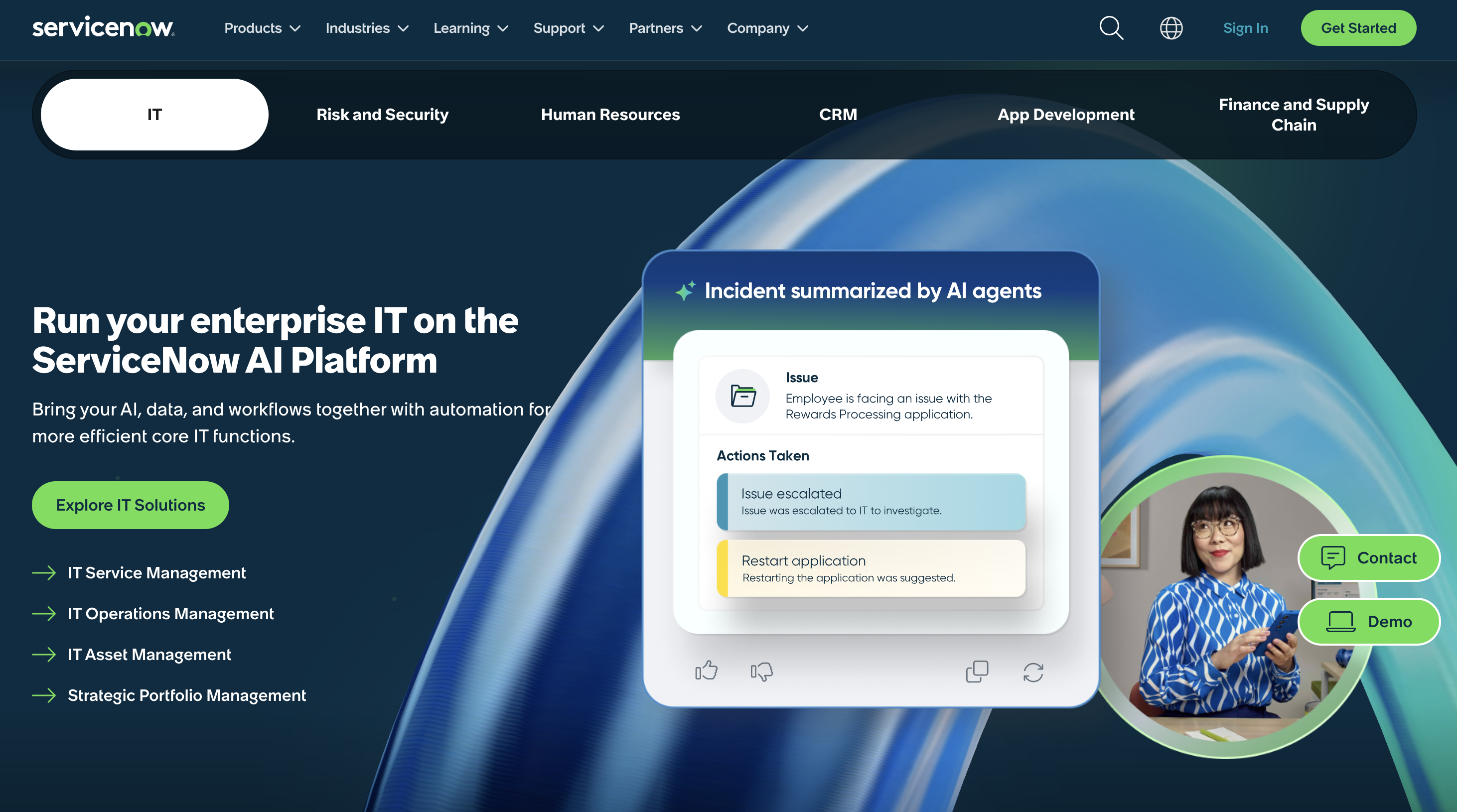
ServiceNow’s Employee Document Management transforms HR file handling by automating document lifecycles within integrated service workflows, ensuring compliance while reducing manual administrative overhead.
Key features:
- Automated document lifecycle management — Documents move seamlessly through workflows, from case creation to secure archival, with built-in retention policies and legal hold capabilities
- Granular security and compliance controls — Role-based access, configurable retention policies, and audit trails ensure sensitive employee data meets regulatory requirements like GDPR
- Employee self-service portal — Team members can access, view, and download their own documents through the Employee Service Center, reducing HR workload
Pricing:
- Custom enterprise pricing — ServiceNow provides tailored quotes based on company size, requirements, and module selection
- Scalable packages available — Flexible pricing structures accommodate different stages of business growth
- Contact required for accurate pricing — No standard pricing published; requires consultation for detailed proposal
Considerations:
- High implementation complexity — The platform requires specialized JavaScript skills for advanced customization and often needs dedicated administrators to manage effectively
- Significant cost investment — Per-user licensing across multiple modules can become expensive, particularly as organizations expand their ServiceNow usage
3. Jira Service Management
Jira Service Management transforms how tech-savvy organizations handle employee file management by embedding document workflows directly into automated, cross-departmental processes. The platform excels at connecting HR teams with IT, facilities management, and other departments through seamless integrations within the Atlassian ecosystem, making it particularly powerful for companies already using Jira Software or Confluence.
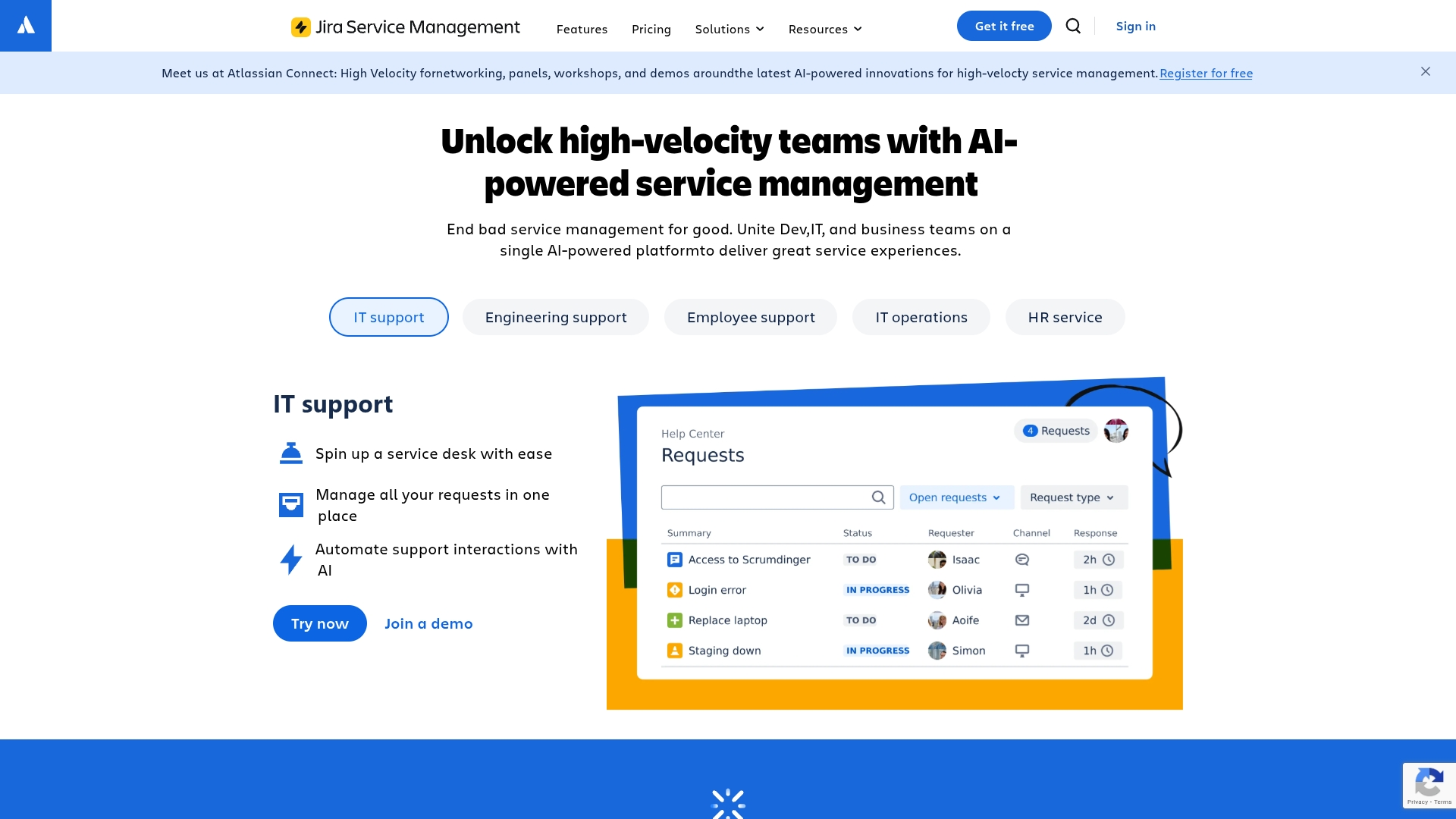
Jira Service Management treats employee file management as part of comprehensive service delivery, automating document handling through cross-departmental workflows like onboarding and offboarding processes.
Key features:
- Confidential case management with strict permission controls for sensitive HR matters and employee relations
- Automated workflow templates that connect HR with IT, facilities, and finance for seamless employee lifecycle management
- Self-service portal where employees can submit requests and upload documents through predefined workflows
Pricing:
- Free: $0/month for up to 10 users with 2 GB storage
- Standard: $7.53 per user/month with 250 GB storage for up to 100,000 users
- Premium: $13.53 per user/month with unlimited storage and 99.9% uptime SLA
- Enterprise: Contact sales for pricing with 99.95% uptime SLA and advanced analytics
Considerations:
- Requires third-party marketplace apps or complex integrations to achieve comprehensive employee file management capabilities
- Steep learning curve with a complex interface that can be challenging for non-technical HR users
4. Zendesk
Zendesk transforms customer service expertise into employee service excellence, bringing the same AI-powered efficiency that delights customers to internal HR and IT support. The platform specializes in creating consumer-grade experiences for employees, making it ideal for organizations already using Zendesk for customer support who want to extend that same quality to their workforce.
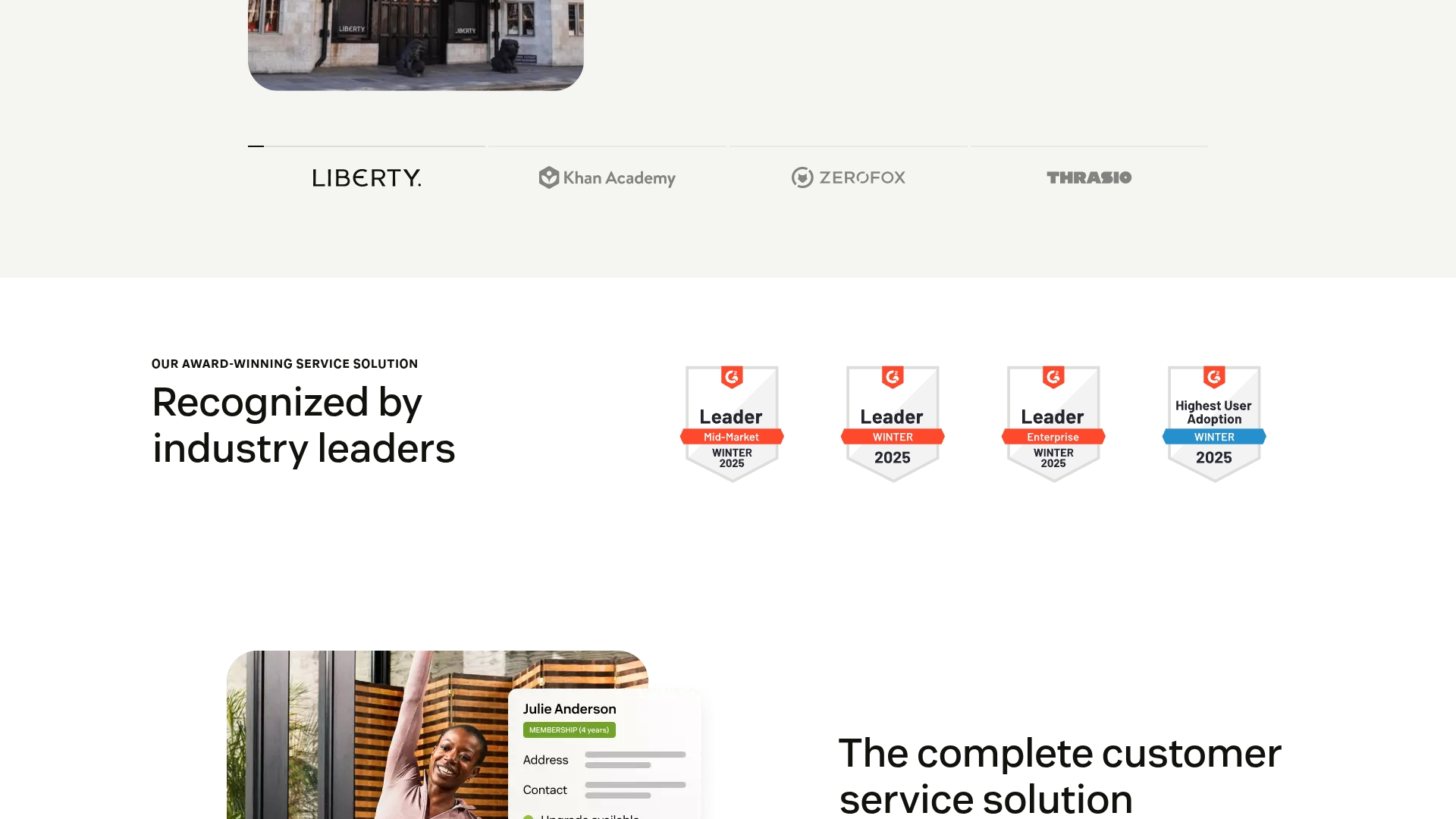
Zendesk applies proven customer service methodologies to employee support, creating seamless internal service experiences through AI-powered ticketing, self-service portals, and automated workflows.
Key features:
- AI-powered employee service suite with automated ticket routing and smart categorization
- Comprehensive knowledge base and self-service portal for company policies and procedures
- Native integrations with major HRIS platforms like Workday, BambooHR, and Rippling
Pricing:
- Support Team: $19 per agent/month (billed annually) or $25 per agent/month (monthly)
- Suite Team: $55 per agent/month (billed annually) or $69 per agent/month (monthly)
- Suite Professional: $115 per agent/month (billed annually) or $149 per agent/month (monthly)
- Suite Enterprise: $169 per agent/month (billed annually) or $219 per agent/month (monthly)
- Additional automated resolutions available from $1.50 each with volume discounts
- Various add-ons available including Advanced AI agents, Quality Assurance, and Workforce Management
Considerations:
- Requires separate HRIS system as Zendesk doesn’t serve as the primary employee record repository
- Per-agent pricing model can become expensive as organizations scale, with additional costs for advanced features
5. Freshservice
Freshservice transforms HR service delivery by applying proven IT service management principles to employee lifecycle processes. The platform specializes in automating complex workflows like onboarding and offboarding, making it ideal for organizations seeking to streamline employee experiences without replacing their core HRIS. Built on ITIL best practices, Freshservice brings structure and accountability to HR operations that traditionally rely on manual processes.
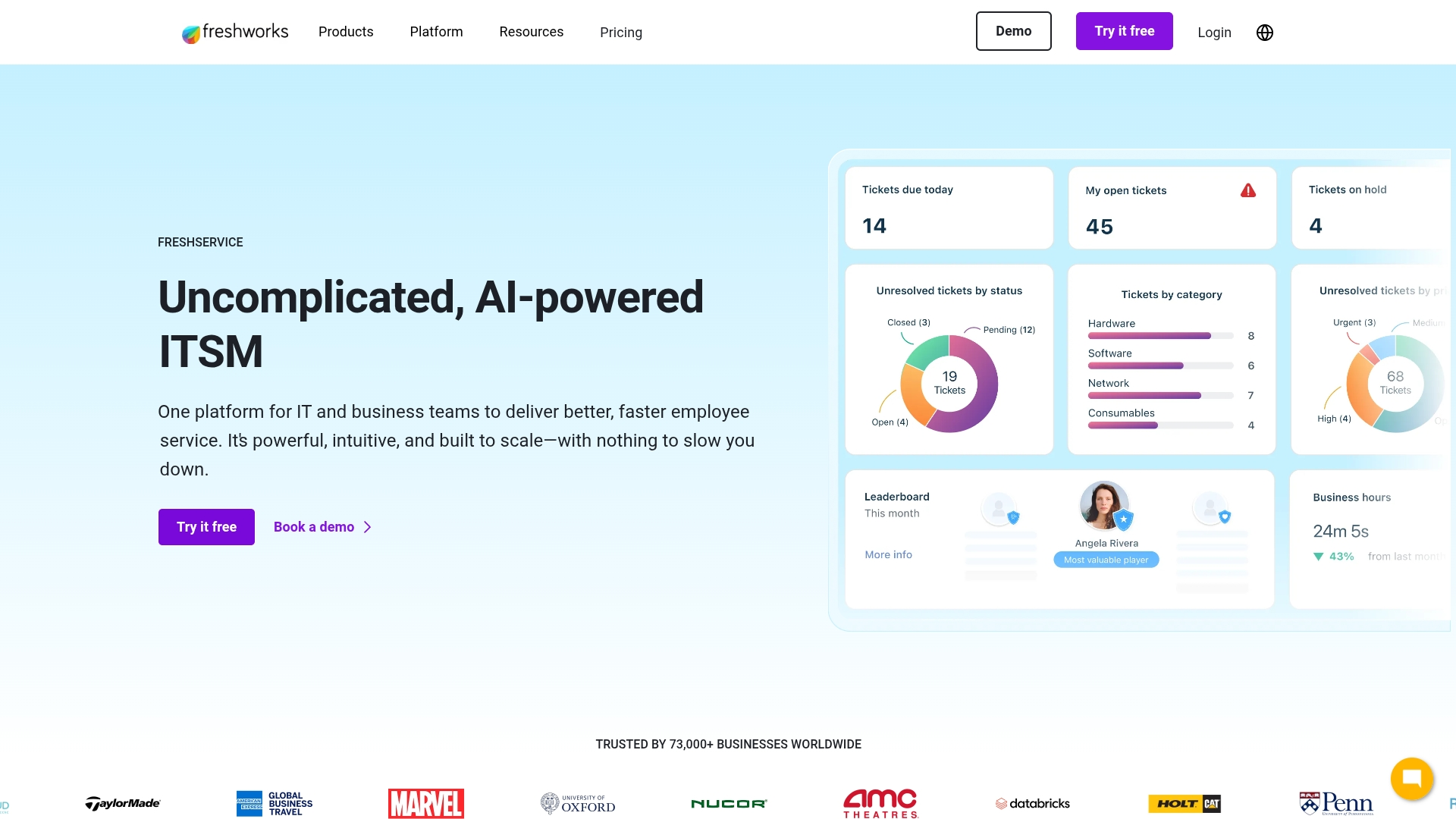
Freshservice excels at managing employee service requests and automating cross-departmental workflows, particularly for organizations that already have a dedicated HRIS and want to enhance their service delivery processes.
Key features:
- Employee lifecycle automation: Streamlines onboarding, offboarding, and role transitions with automated workflows that coordinate tasks across IT, HR, and finance departments
- Self-service portal: Empowers employees to find answers, request services, and track status updates through a centralized knowledge base and service catalog
- Document automation: Generates employee-related documents using customizable templates with secure e-signature capabilities built directly into the platform
Considerations:
- Not a comprehensive HRIS: Freshservice focuses on service delivery rather than being a complete employee file repository, requiring integration with existing HR systems for full functionality
- Limited to service management: The platform excels at managing requests and workflows but doesn’t replace core HR functions like payroll, benefits administration, or maintaining complete employee records
Transform your HR document management with monday Service
Your HR team deserves better than endless document scavenger hunts. monday Service consolidates every employee file into one secure, intelligent hub.
No more scattered drives, lost email attachments, or compliance anxiety. Just instant access to exactly what you need, when you need it.
Build the perfect HR system for your organization with our intuitive no-code platform. Design workflows that match how your team actually works, not how software thinks you should work. Then watch our AI handle the tedious stuff: automatically classifying documents, extracting critical data, and routing approvals while your team focuses on what matters: your people.
But here’s where monday Service truly shines: seamless integration across your entire organization. Connect HR with IT, finance, operations, and every other department to create a unified ecosystem where information flows freely and decisions happen faster. New hire provisioning that used to take days now takes hours. Payroll verification becomes automatic. Compliance reporting shifts from stressful to effortless.
Ready to give it a go?
FAQs
How long does employee file management software implementation typically take?
The time it takes to implement employee file management software varies, ranging from a few days for simple cloud platforms to several weeks for complex systems with heavy data migration.
What is the average cost of HR document management systems?
Costs typically range from $5 to $50 per user per month, with custom pricing available for enterprise-level features and integrations.
Can employee file management software handle international compliance requirements?
Yes, modern platforms are built to support global regulations like GDPR and can automate retention policies based on location.
How do you convert existing paper files to digital employee records?
You can convert paper files through document scanning services or internal scanning processes, and many platforms use AI to automatically classify the digitized documents.
What training is required for HR document management software?
User-friendly systems require minimal training, often just a few hours for both general users and administrators to get fully up to speed.
How does digital file management improve HR audit preparation?
It centralizes all documents and provides instant access, complete audit trails, and automated compliance reports to dramatically streamline audit prep.